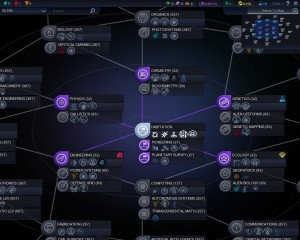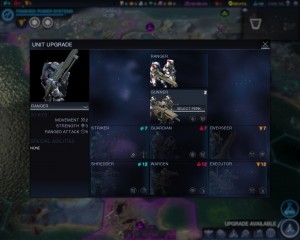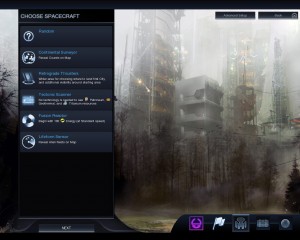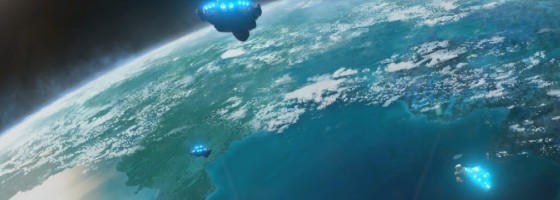The Civilization series from Firaxis and Sid Meier have been one of the long standing foundations of PC and turn based strategy game design. With Civilization Beyond Earth, the series for the first time moves off of planet Earth and explores the world of Science Fiction. But despite the new coat of paint and locale, the game can’t escape the orbit of Civilization 5, for better and for worse.
Space Continuation:
Civilization Beyond Earth’s story is basically continuing a civilization game after someone completes the space race victory condition. Different spaceships have been launched and now must make do on an alien world with new researches, enemies and situations.
Let’s get two things out of the way, one: This is not Alpha Centauri 2. Despite the science fiction setting, a lot of what made that game unique is not present here. This brings me to point two: The game is very much built off of the foundation and game engine of Civilization five. If those two points are too much of a negative, you can stop reading this analysis here as you probably won’t like Beyond Earth.
But from the foundation of Civilization five, Beyond Earth does do some new things. First is that there is a lot more variety in terms of starting game conditions thanks to the ability to customize your landing party. While the different sponsors (AKA Civs) don’t have unique units, this does free up the developers to give you more choices with how you start a game.
“Freeing up” appears to be the mantra for Beyond Earth, as the developers used the sci-fi setting to full effect with changing how a Civilization game is played. From the get-go you’ll find your new alien home a harsh fresh experience. Miasmas is littered throughout that causes damage for any units that stand on it over a course of a turn, aliens roam the land who will attack you if you get too close and of course new resources to find and make use of.

The new web interface and design of the tech tree is a great way of providing a variety of strategies instead of doing the same thing again and again
New orbital units can be built to provide added bonuses at the cost of taking up space and in the late game, can rain laser death down on unsuspecting enemies.
As in previous titles, expect to build cities, manage health (which replaces happiness), construct wonders and improve your colony with researches and this is where Beyond Earth takes the biggest jump from previous Civilization titles.
Teching Up and Out:
Anyone who has played a previous Civilization game will tell you how linear the tech tree was. This was due to the fact that you’re dealing with the real world technologies so of course you’re going to have to research things like writing, the wheel etc. But Beyond Earth’s sci-fi setting already has the basics done with and extends the tech tree with a new web like interface full of future technologies.
The various techs are spread out with major researches and then secondary ones for each one. Researches can unlock new buildings, improvements, wonders, units and so on with the secondary ones act as specializations to enhance those options. This is a major step from previous titles where you were going to unlock everything in the course of a single game. Here, it’s simply not possible and you won’t want to due to the further areas of specialization.
Virtues are similar to choosing your ideology from previous titles and can give you bonuses relating to combat, industry, health and research. Affinities are philosophical changes to your colony and determine what victories you can go after and how your units will evolve.
As you research certain techs, you’ll earn points towards the different affinities. Each affinity provides colony wide bonuses at certain levels and will also be used to upgrade the military units to affinity specific versions. The combination of the new tech tree and affinities help flesh out your strategies mid to late game and give Beyond Earth’s gameplay and potential strategies a much needed sense of personalization compared to Civilization 5.
However for all the changes Beyond Earth brings to the table, there is a debate over whether this is a new game or just Civ 5 in space.
Space Sickness:
The main problem for me with Beyond Earth is that too much of the game feels like Civilization 5 and I just did not like Civilization 5. I found the combat system to be boring, too much of my time spent waiting for things to happen instead of making interesting choices and the UI didn’t give me enough information.
And all those issues are in full display in Beyond Earth. There aren’t as many units in the game as the bulk of your army technically becomes unlocked via the affinity system. It felt like the majority of my time spent was simply clicking the “next turn” button while I was waiting for things to be finished.

Instead of a huge number of units, Beyond Earth features a small number that are then altered via affinities.
Because of the sci-fi theme, Civ fans are back to square one in terms of learning how things work which is great, but it also makes it even harder to learn what you should be doing.
Chances are as you’re reading this, people are already figuring out the perfect strategies for each affinity and researches to go through. And it will only be a short time before people break the game.
Information such as defensive stats for land tiles, what resources do, combat strengths and weaknesses and more were hard to find. For instance a missile unit who the description says is good against outposts and cities, didn’t mention the fact that it could also be used to take down orbital units.
Another thing is that the game engine makes everything have that washed out look to it which makes it hard to see what everything is. And yes, expect to accidently walk into miasmas fields until you get use to the graphics.
Lastly the diplomacy options and AI still feel very similar in their depth or lack thereof with the AI factions. A new trade option of being owed favors is interesting but it still feels like you’re playing a scripted system as opposed to actual players. And in one of my games, the faction that hated me did nothing, while the one who I was good to and friendly with declared war. And even after declaring war it had no idea how to attack my cities and I drove it back with an army half their size.
Ultimately, again with a Civilization title I find myself just going through the motions instead of actually playing or improving. When a game is up, I haven’t really learned anything new strategy or tactics wise whether or not I won or lost.
Down to Earth:
The changes that Beyond Earth bring to the table are welcomed but the game just doesn’t do enough to distinguish itself from Civilization five. And as I said in the beginning, if you hated Civilization five, Beyond Earth will not do anything for you.

Starting conditions are a lot more varied this time and go well with the setting of a mysterious planet
What I really want to see is a ground up redesign of the Civilization formula making use of Beyond Earth’s better use of personalization.
Of course it goes without saying that Firaxis will continue to improve the game via patches and DLC so there is a chance that this analysis will become invalid at some point. But for now, our great sci-fi future doesn’t show much promise.

